|
|
|
Sort Order |
|
|
|
Items / Page
|
|
|
|
|
|
|
| Srl | Item |
| 1 |
ID:
130956


|
|
|
|
|
| Publication |
2014.
|
| Summary/Abstract |
In July 2013 the UK's coalition government published "The Civil Service Reform Plan - One Year on", reporting on progress against minister Frances Maude's objectives to shake up the civil service. This followed various reported disagreements between ministers and civil servants over policy implementation, and a research report commissioned by the government from think tank IPPR into lessons from overseas for civil service reform. This trio of short articles reviews the government's proposals from three perspectives: that of the lead author of the IPPR report, a former senior civil servant, and the chair of the House of Commons Public Administration Committee (PASC) which oversees the civil service. The authors take differing views on the proposals, which include introduction of 'extended ministerial offices', and greater control by ministers over choosing their civil servants. Should these be seen as useful next steps, worrying developments, and/or large and important enough to merit a Commission on the civil service, as PASC has suggested?
|
|
|
|
|
|
|
|
|
|
|
|
|
|
|
|
| 2 |
ID:
133602
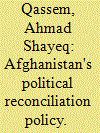

|
|
|
|
|
| Publication |
2014.
|
| Summary/Abstract |
The Afghan government's peace and reconciliation overtures to the militants, initially at the unofficial level but later sanctioned officially, have formed a key theme of state security policy from the early days of the post-Taliban administration in Afghanistan. Yet far from producing peace and stability, they seem to have played into the hands of the violent groups intent on overthrowing the country's internationally supported and legitimate political system in the past decade. There is no doubt about the importance of national reconciliation as a wider process of overcoming the legacy of beleaguered social relationships and forging a common vision for the future among all Afghans, but the nature of the government's reconciliation policy, which borders on appeasement of the militants, seems so far to have created more vulnerabilities than strengths in the face of increasingly emboldened anti-state violent groups.
|
|
|
|
|
|
|
|
|
|
|
|
|
|
|
|
| 3 |
ID:
111936
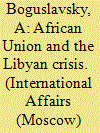

|
|
|
|
|
| Publication |
2012.
|
| Summary/Abstract |
ARLY IN SEPTEMBER 2011, the forces of the National Transitional Council (NTC) of Libya backed, on a mass scale, by NATO assumed control over the larger part of the country and captured Tripoli. The regime change became a fact yet the country will have to tread a long and arduous road of rehabilitation of its now practically non-existent infrastructure and address a more important and even more challenging task of national reconciliation and revival of national unity. It seems that external military interference (far beyond the limits outlined by UN Resolution 1973) has made this dual task even harder to achieve. It caused unnecessary loss of civilian lives, stirred up hard feelings which pushed the east and west of the country apart, destroyed civilian objects and started uncontrolled proliferation of all sorts of weaponry.
|
|
|
|
|
|
|
|
|
|
|
|
|
|
|
|
| 4 |
ID:
074912
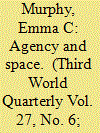

|
|
|
|
|
| Publication |
2006.
|
| Summary/Abstract |
Recent political reforms in the Gulf Arab countries have been variously understood as regime survival strategies, correlates of economic globalisation, and even the end result of US pressure to democratise. This paper examines the possible role played by the introduction of modern information and communication technologies (icts) in stimulating political liberalisation in the Gulf Arab states. Rather than attempting to quantify their democratising impact, this paper utilises the concept of agency, examining how the range of agents of ict production and diffusion in the region have sought to influence the actual impact upon political space. It concludes that modern icts have demonstrated the potential to expand the existing public sphere, and to create new opportunities for liberal political activity. However, the particular configuration of agency in the countries in question has meant that the state and its allies have retained a significant degree of control over the extent and nature of the political space, a process in which local society may have in some instances collaborated. Thus, while the introduction and diffusion of new icts may have contributed to the pressures which led to some of the political reforms in evidence in the Gulf Arab states, one cannot argue that they amount, at least as yet, to a sustained and effective attack on illiberal political structures. The first part of this paper surveys the existing body of literature in an effort to devise a framework for the subsequent study of two principal contemporary icts (satellite television and the internet) in the Gulf Arab states.
|
|
|
|
|
|
|
|
|
|
|
|
|
|
|
|
| 5 |
ID:
130945
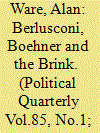

|
|
|
|
|
| Publication |
2014.
|
| Summary/Abstract |
In the early autumn of 2013 large minorities in Italy and the United States fermented crises that badly disrupted the government of the two countries. These cases were widely understood as instances of dysfunction in established democracies that would rarely be replicated elsewhere. However, while all the conditions that generated the crises are unlikely to be evident in other established democracies three important factors that caused the disruptions in the American and Italian political processes are also sources of political conflict in Britain. They are the powers of the second legislative chamber, the weakening links between parties and social groups, and the redrawing of electoral boundaries. All of them present problems for political reform in Britain, and understanding the role they played in the two political crises of 2013 is important for future reform in Britain.
|
|
|
|
|
|
|
|
|
|
|
|
|
|
|
|
| 6 |
ID:
193045


|
|
|
|
|
| Summary/Abstract |
On 20 October 2020, the military and police force opened fatal shootings at peaceful unarmed #EndSARS protesters. This article examines the political and socio-economic undercurrents of #EndSARS protest. It argues that the predatory state–society relations where the state is the predator and citizens are the preys nurtured the increasing distrust between the state and its citizens, and ultimately, resulted in the deepening mutual mistrust between the police and people. The article concludes that the #EndSARS protest created opportunity for the Nigerian state to accelerate and accumulate its bourgeoning repressive character instead of reducing it. It recommends symbiotic state–society relations.
|
|
|
|
|
|
|
|
|
|
|
|
|
|
|
|
| 7 |
ID:
131999
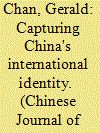

|
|
|
|
|
| Publication |
2014.
|
| Summary/Abstract |
What is China's international identity? How has it changed over time, especially since the reform and opening up of the country in the late 1970s? How does China see itself? And how do other countries see China? I argue that answers to these questions are instrumental to a proper understanding of Chinese foreign-policy behaviour, in ways more significant than we normally assume. To advance this argument, I choose to examine China's social interactions with the outside world to ascertain the evolution of its international identity/identities. I shall trace the domestic sources of China's external policies. In so doing, I hope this article will elucidate the 'debates' between social constructivism and realism as to their relative explanatory power with respect to the making of Chinese international identity. I also hope it will throw light on a possible alternative framework, known as social evolution, for studying China's international relations and its evolving identities.
|
|
|
|
|
|
|
|
|
|
|
|
|
|
|
|
| 8 |
ID:
128241


|
|
|
|
|
| Publication |
2013.
|
| Summary/Abstract |
On 30 November 2000 the UK Government enacted legislation leading to the formalisation of freedom of official government information (within specified bounds) for the UK voting public. The Freedom Information Act (FOI Act), although passed into law in 2000, did not come into full effect in the UK until January 2005. In order to 'police' the Act, the Information Commissioner's Organisation (ICO) was set up. The ICO is responsible for monitoring the performance of 43 government bodies1 against performance requirements under the FOI Act 2000. This includes a deadline for responding to initial Requests for Information (RFIs) of 20 working-days. The ICO also handles any unresolved2 complaints or disputes concerning non-disclosure or late release of information requested under an RFI.
To head the ICO, the new post of Information Commissioner was created in January 2001, subsuming the previous role of the Data Protection Registrar.3 The incumbent works within the bureaucracy of the Ministry of Justice (MOJ), reporting directly to Parliament in order to remain politically independent.4 The powers of the Information Commissioner include the use of various levels of sanction. These include formal legal action against government bodies that fail to comply with the provisions of the FOI Act 2000 and other related information legislation.5 Every quarter, and annually, the UK Statistics Authority, on behalf of the ICO and the MOJ, reports on the performance of all 43 monitored government bodies against the requirements of the FOI Act 2000.
|
|
|
|
|
|
|
|
|
|
|
|
|
|
|
|
| 9 |
ID:
129202


|
|
|
|
|
| Publication |
2014.
|
| Summary/Abstract |
The Chilean Presidential and Parliamentary elections of the first-round general election on November 17th and the second round run-off for the presidency between remaining candidates Michelle Bachelet and Evelyn Matthei on December 15th, 2013 were decided by problems, not by ideology, and by past rather than future issues. These issues, partly hidden from the international public, are likely to remain over the next years. Thus comprehending them is crucial to understand the transition of the country.
|
|
|
|
|
|
|
|
|
|
|
|
|
|
|
|
| 10 |
ID:
128851


|
|
|
|
|
| Publication |
2014.
|
| Summary/Abstract |
Two recent books tell the story of the transition to Chile's now-vibrant democracy. Their complementary perspectives provide context for the choices Chileans made in last year's presidential elections. In an eerie confluence of fates, the two top contenders for Chile's presidency in late 2013, Michelle Bachelet and Evelyn Matthei, were actually childhood playmates. Their fathers, both air-force generals, had been friends and neighbours, but had contrasting political leanings and found themselves on opposite sides of the dictatorship that seized power in 1973. Mr Bachelet had become a high-ranking official in Salvador Allende's socialist administration, and was effectively tortured to death after the 1973 military coup that installed Augusto Pinochet as president. Mr Matthei, in contrast, was a rising star within the Pinochet regime, becoming head of the air force and ultimately working in the building in whose basement Mr Bachelet was detained and tortured. Thus, Michelle Bachelet and Evelyn Matthei represented not only two different futures, but two opposing pasts. While Bachelet promised free universal education and political reform, Matthei vowed to continue the policies of Chile's outgoing conservative president. The symbolism was anything but subtle.
|
|
|
|
|
|
|
|
|
|
|
|
|
|
|
|
| 11 |
ID:
054212
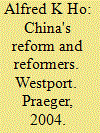

|
|
|
|
|
| Publication |
Westport, Praeger, 2004.
|
| Description |
x, 174p.hbk
|
| Standard Number |
0275960803
|
|
|
|
|
|
|
|
|
|
|
|
Copies: C:1/I:0,R:0,Q:0
Circulation
| Accession# | Call# | Current Location | Status | Policy | Location |
| 048704 | 951.050922/ALF 048704 | Main | On Shelf | General | |
|
|
|
|
| 12 |
ID:
130955
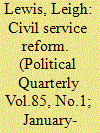

|
|
|
|
|
| Publication |
2014.
|
| Summary/Abstract |
In July 2013 the UK's coalition government published "The Civil Service Reform Plan - One Year on", reporting on progress against minister Frances Maude's objectives to shake up the civil service. This followed various reported disagreements between ministers and civil servants over policy implementation, and a research report commissioned by the government from think tank IPPR into lessons from overseas for civil service reform. This trio of short articles reviews the government's proposals from three perspectives: that of the lead author of the IPPR report, a former senior civil servant, and the chair of the House of Commons Public Administration Committee (PASC) which oversees the civil service. The authors take differing views on the proposals, which include introduction of 'extended ministerial offices', and greater control by ministers over choosing their civil servants. Should these be seen as useful next steps, worrying developments, and/or large and important enough to merit a Commission on the civil service, as PASC has suggested?
|
|
|
|
|
|
|
|
|
|
|
|
|
|
|
|
| 13 |
ID:
130954
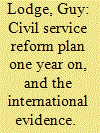

|
|
|
|
|
| Publication |
2014.
|
| Summary/Abstract |
In July 2013 the UK's coalition government published "The Civil Service Reform Plan - One Year on", reporting on progress against minister Frances Maude's objectives to shake up the civil service. This followed various reported disagreements between ministers and civil servants over policy implementation, and a research report commissioned by the government from think tank IPPR into lessons from overseas for civil service reform. This trio of short articles reviews the government's proposals from three perspectives: that of the lead author of the IPPR report, a former senior civil servant, and the chair of the House of Commons Public Administration Committee (PASC) which oversees the civil service. The authors take differing views on the proposals, which include introduction of 'extended ministerial offices', and greater control by ministers over choosing their civil servants. Should these be seen as useful next steps, worrying developments, and/or large and important enough to merit a Commission on the civil service, as PASC has suggested?
|
|
|
|
|
|
|
|
|
|
|
|
|
|
|
|
| 14 |
ID:
131459


|
|
|
|
|
| Publication |
2014.
|
| Summary/Abstract |
This article critically assesses the conflict within the Orthodox Church of Jerusalem between the Greek hierarchy and the Arab laity concerning the proposals of the Mandatory Government for a new regulatory framework for patriarchal operation. The British presented two draft reform ordinances, neither of which met Arab expectations. Instead of promoting the laity's emancipation from 'foreign' Greek administrative and financial control, the ordinances left little room for a true inversion of the power structure between the two opposing camps, retaining the status quo at the expense of the Arab Orthodox rights.
|
|
|
|
|
|
|
|
|
|
|
|
|
|
|
|
| 15 |
ID:
127846


|
|
|
|
|
| Publication |
2013.
|
| Summary/Abstract |
William James Booth elaborates three main challenges to my social lineage account (Patten 2011). Conceptually, he finds the proposal to be question-beginning. Normatively, he thinks that it has objectionable implications. And, substantively, he claims that the proposal is unhelpful, in that it fails to explain a case of theoretical importance for multiculturalism. In this reply, I argue that each of these challenges misses the target. The social lineage account continues to offer a promising, nonessentialist basis for normative multiculturalism.
|
|
|
|
|
|
|
|
|
|
|
|
|
|
|
|
| 16 |
ID:
128527
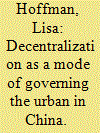

|
|
|
|
|
| Publication |
2013.
|
| Summary/Abstract |
This paper considers what a Foucauldian-informed analysis of decentralization and urban transformation offers to current debates. It analyzes decentralization as a new regime of governing, in contrast to many studies that treat it as a policy process, objective or outcome aimed at alleviating some problem of centralized authority. Rather than understanding decentralization as less state governance, this paper asks how practices such as local autonomy are in fact technologies of governing the urban. Decentralization is analyzed then not simply as an absence of some central state power, either in the political or fiscal realm, but rather, as new mechanisms of governing the urban, which are linked with the regulation and constitution of subjects. The paper focuses on an aspect of decentralization that typically is under-examined: the decentralization of welfare provisioning in urban China. Under high socialism of the Maoist era, social services for urban residents were distributed by the state, through the work unit (danwei) as part of the planned economy. In recent years, however, major reforms have been put into place to diversify the ways in which social services are delivered, under a general rubric of decentralizing the distribution away from the state. Based on anthropological research in Dalian, a major port city in northeast China, this paper examines a new social practice and subject form that has emerged with new ways of caring for those in need in the city: volunteerism. By focusing on this resulting social form, the paper argues that we may better understand how decentralization is not a singular process with multiple outcomes, but rather, a complex assemblage of elements that includes technical questions about how to govern as well as normative practices of subject formation. An analytical disaggregation of these elements also allows us to avoid the assumption that decentralization necessarily contains certain characteristics, or that it will lead to particular kinds of political and social forms.
|
|
|
|
|
|
|
|
|
|
|
|
|
|
|
|
| 17 |
ID:
130962
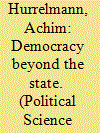

|
|
|
|
|
| Publication |
2014.
|
| Summary/Abstract |
MODERN DEMOCRACY IS, ABOVE ALL ELSE, a procedural ideal. To be sure, high substantive hopes are often placed in democracy. Yet the essence of democracy lies not in the specific outcomes that it may (or may not) help reach, but in a set of procedures that ensure, in the words of Philippe Schmitter and Terry Karl, that "rulers are held accountable for their actions in the public realm by citizens," who act primarily "through the competition and cooperation of their elected representatives."1 Historically, the main political arena in which democratic procedures have been implemented, and the main reference point for democratic theory, has been the state. According to a well-established argument, the democratization of non-state entities-such as international and supranational organizations or transnational networks with various degrees of institutionalization-is therefore faced with significant conceptual and practical challenges.2 This article seeks to assess the severity of these challenges: Can democratic procedures be transferred to political entities "beyond the state," or is democracy doomed to failure in non-state contexts?
|
|
|
|
|
|
|
|
|
|
|
|
|
|
|
|
| 18 |
ID:
100975
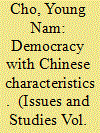

|
|
|
| 19 |
ID:
118160
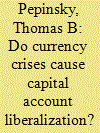

|
|
|
|
|
| Publication |
2012.
|
| Summary/Abstract |
A central argument in the literature on economic crises and policy reform is that currency crises lead governments to liberalize their capital accounts in order to establish their credibility to international markets. I argue that the reverse is true: currency crises lead governments to restrict capital flows as a form of self-help. Using instrumental variables to account for the possibility that capital account liberalization causes currency crises, I show that currency crises are robustly associated with capital account closure across developing countries. The findings refocus the debate on currency crises and capital account liberalization and contribute to larger debates about the role of critical junctures in prompting neoliberal policy reform.
|
|
|
|
|
|
|
|
|
|
|
|
|
|
|
|
| 20 |
ID:
128400
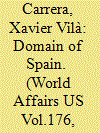

|
|
|
|
|
| Publication |
2014.
|
| Summary/Abstract |
A specter is haunting Spain. It comes from a promise made on November 13, 2003, by José Luis Rodríguez Zapatero, then secretary general of Spain's Socialist Party and a candidate for prime minister of the country. "I will support any reform of the Catalan Statute of Autonomy approved by the Catalan Parliament," he told twenty thousand people gathered in Barcelona's Palau Sant Jordi, referring to the law that oversees the government of Catalonia. Then, to the delight of an astonished audience, he went on to recite, in Catalan, a verse by the beloved poet Miquel Martí i Pol. Zapatero's words resonated strongly among the left-wing establishment poised to make history in the Catalan election three days later.
|
|
|
|
|
|
|
|
|
|
|
|
|
|
|
|
|
|
|
|
|